Report on the 7th Global Reggae Conference
SST has been a proud partner for the 7th staging of the Global Reggae Conference, organised by the Institute of Caribbean Cultural Studies and the Reggae Studies Unit together with the Perry Henzell Estate, and held at University of the West Indies, Mona Campus (Jamaica) between the 16th and the 19th of February, 2022. As part of the SST contingent that made it to the event in-person, reggae historian and SST associate David Katz provides us with an insightful report of the event.
—
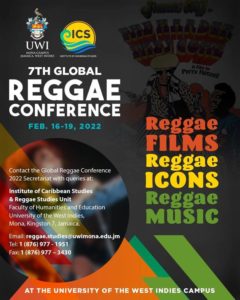
7th Global Reggae Conference poster.
Despite the challenges of staging a ‘hybrid’ event during the current throes of the pandemic, the seventh edition of the Global Reggae Conference maintained the high standards set by previous editions, raising much stimulating debate about various aspects of the music and culture of Jamaica, the Jamaican diaspora, and the world at large. Jointly overseen by Dr Sonjah Stanley Niaah and Dr Dennis Howard of the University of the West Indies Mona, Jamaica campus, the 2022 edition came under the banner of “Reggae Films, Reggae Icons, Reggae Music,” and as it chimed with the 50th anniversary of the premiere of Perry Henzell’s ground-breaking masterpiece of Caribbean cinema, The Harder They Come, several of the best presentations allowed for new ways of interrogating the film, with nuanced suppositions making plenty of space for alternate readings and symbolic interpretations.
On the opening day of 16 February, after some general greetings and opening remarks from prominent faculty at UWI Mona and colleagues, including Professor Silvia Kouwenberg, Dean of the Faculty of Humanities and Education, Dr Dave Gosse, Head of the Institute of Caribbean Studies, Professor Julian Henriques of Goldsmiths, University of London (representing the Sonic Street Technologies team) and Justine Henzell, a film producer and director who is custodian of Perry Henzell’s Estate, the Sonic Street Technologies team was given an ample platform to explore the nexus of reggae and film.
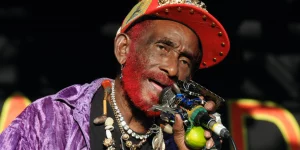
Iconic Jamaican artist Lee “Scratch’ Perry whose involvement with films was discussed.
I kicked things off with an exploration of Lee ‘Scratch’ Perry on film, using clips from seven different documentaries produced between 1977 and 2015 to shed light on Perry’s musical and spiritual evolution, his non-standard worldview and the dramatic transformation that saw him become a wandering nomad after closing the doors of his Black Ark studio during the late 1970s. There was plenty of lively debate in the question-and-answer session that followed as various aspects of Perry’s behaviour was considered, as well as how that related to the music and art he made during a career that lasted over 60 years and only ended with his unexpected passing last August, at the age of 85.
Then, the Jamaican wing of SST stepped up to the plate, with Sonjah Stanley Niaah, Dennis Howard and former Goldsmiths student Ashly Cork jointly presenting the findings of their research into videography and spectacle in dancehall culture, looking in particular at various aspects of the ‘video light’ phenomenon, which Dr Niaah framed as a component of Jamaica’s ‘street theatre’; after some definitions and context were discussed, Dr Howard contrasted the figure of highly-rated videographers Jack Sowah and Leo O’Reggio to highlight important differences of social class and insider/outsider perspectives. There were also explorations of the role of Yard Tapes in spreading the culture, and the more recent impact of Covid-19.
Leo Vidigal of the Federal University of Minas Gerais in Brazil then gave a remote presentation looking at sound system films as a ‘true subgenre of reggae films,’ touching on iconic movies such as The Harder They Come, Pressure, Rockers, Dread Beat And Blood, Babylon and Sound Business, before going on to detail some Brazilian films that have looked at different aspects of the culture in Brazil, which has been a growing phenomenon in different cities since the 1970s. We were fortunate that Dr Vidigal was able to screen clips of films shot in São Paulo and other Brazilian locations, giving us a window to sound system worlds in that nation, including Fyah: A Remix Film On Dancehall and Sound System: The Voice Of The Ghetto.
The final SST presentation came via the Jamaican premiere of In A Vanguard Style: A Documentary On Iration Steppas, which Prof Henriques had specially arranged with the filmmakers. The film raised important points about the nature of sound system culture in the Black British North and the distinctive aspects of Iration Steppas as a sound system and production unit, with much stimulating discussion once again coming in the post-screening Q&A.
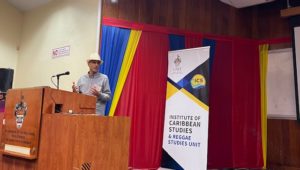
Julian Henriques introducing the Sonic Street Technologies project.
The presence of Rastafari in reggae films was then given a sensitive rendering by the pioneering journalist and filmmaker Barbara Blake-Hannah, whose personal approach supplied plenty of thoughtful ammunition to ponder portrayals of the faith in films such as Rockers, Countryman, and the Peter Tosh documentary Stepping Razor—Red X, plus overlooked cult classics Every Nigger Is A Star and The Marijuana Affair (the latter with PNP minister Dudley Thompson), as well as films for the dancehall age, including The Lunatic, Dancehall Queen and the hugely successful Third World Cop, alongside commercial ventures such as Club Paradise and Mighty Quinn, but the first point of reference was of course The Harder They Come, with which Mrs Blake-Hannah is intricately involved, and her memories of staging the Reggae Film Festival for six years was very much a story of the planets aligning for a time, before ultimately de-aligning, though the work of more recent directors such as Storm Saulter, Ras Kassa, Jay Will and Nordia Rose points towards a potentially brighter and more representative on-screen future.
Jamaican ethnomusicologist Dr David Aarons then gave a fascinating presentation on the utopianism of reggae music videos shot in Ethiopia by repatriated Rastafari, illuminating his suggestions with video clips and more pertinently through his personal memories of travelling across Ethiopia as a member of Sidney Salmon’s backing band. Dr Aarons was able to bring his presentation to life through such recollections, which helped unpack the contradictory elements embedded in the videos themselves.
Former CNN and Al Jazeera journalist Nadine Drummond then explored aspects of the recent Netflix smash The Harder They Fall, positing that the inclusion of Dennis Brown’s “Promised Land” on the soundtrack pointed to a utopian homecoming for Rastafari, with the fictional Westwood equating to Shashamene in her interpretation.
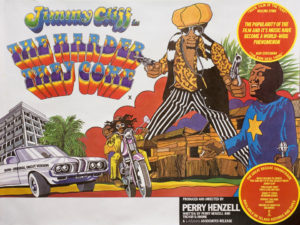
Perry Henzell’s 1972 movie inspired the conference topic.
Day two’s highlights included Melville Cooke’s open-ended explorations of representations of rural St Andrew in five contemporary music videos (including the evocative imagery of Mortimer’s “Lightning”), Dr David Bousquet’s critical exploration of contradictions inherent in the documentary film Inna De Yard: The Soul of Jamaican Music, Tim Wall and Benjamin Torrens’ positive dissection of Steve McQueen’s Small Axe series, and some thoughts on the need for policy surrounding what is acceptable in Jamaican music culture by Dr Deborah Hickling Gordon (contrasting the imagery of Mortimer’s “Lightning” with Skillibeng’s caustic “Crocodile Teeth”), as well as thoughts on identity, belonging, hope and resistance in the music of Bob Andy from Gavin Myers.
Towards the end of the day, a screening of the short film Blue Boy conjured images of south London in the early 1980s, when sound tapes held great currency, though a lack of contextual information about the film meant that the audience had to draw their own conclusions. Additionally, Dr Carolina Maria Bruzaca Pinto of the Federal University of Maranhão in Brazil also offered some thoughts about the appeal of reggae to the black residents of São Luis in Brazil’s far northeast, which she traced to the quilombo of Liberdade (founded as a free village by local equivalents of Maroons in colonial times), despite English being sparsely spoken.
The third and final day began with more explorations of Steve McQueen’s Small Axe series, this time with Joseph Powell offering a kind of visual remix of some of its highlights, before Agostinho Pinnock pointed to the shortcomings of episodes such as Lover’s Rock, whose perceived inaccuracies caused a Twitterstorm following its initial showing on BBC television. In contrast, Dr Jahlani Niaah explored notions of the black Madonna as a part of alternate Christian iconography, which was then related to symbolic elements of certain reggae and dancehall songs, including Errol Dunkley’s “Black Cinderella,” Judy Mowatt’s “Black Woman,” and the antithetical nature of contemporary dancehall’s worrying trend of ‘suck your mother’ tunes.
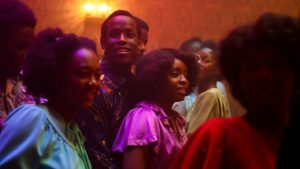
A scene from Steve McQueen’s Small Axe episode ‘Lover’s Rock’.
Later, we were treated to various meditations on aspects of The Harder They Come, beginning with ethnomusicologist Dr Scott Currie’s thoughtful exploration of the rock steady that permeates its soundtrack; Dr Nicole Plummer looked at notions of fear and dread embedded in the screenplay and soundtrack; Nicole Williams helped us to understand the movie’s longstanding delineation as a cult film; Robert Hall gave an interesting presentation on the film’s portrayal of male popular fashion and Dr Anna Kasafi Perkins and Ms Kay Hinds-Thompson gave a riveting exploration of the role of women in the movie and its soundtrack, with nuanced perceptions of the use of water throughout the film, in both symbolic and actual terms—a masterful presentation that generated much stimulating conversation.
Then, Italian sound system veteran Ms Nadine Dogliani treated us to the final film screening of the event, entitled The Only Good System Is A Sound System, which presented a mix of archive footage and original material to remind of the vital presence of sound systems at the Notting Hill Carnival in the early years of the new millennium, as well as the sound system scenes of Italy, where legendary sound systems such as Channel One and Iration Steppas have often played, as well as local sound systems such as King David Warriors (KDW), of which Ms Dogliani was a part.
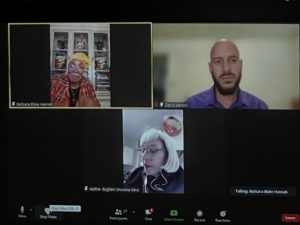
Barbara Blake-Hannah, David Aaron and Nadine Dogliani presenting Zoom.
That evening, the conference closed in fine style online through the delivery of the 25th Annual Bob Marley Lecture, which took the form of a lively conversation about The Harder They Come between Justine Henzell and UWI’s Dr Rachel Moseley-Wood, complimented by some perceptive commentary from Professor Carolyn Cooper, who spearheaded the annual Bob Marley Lecture itself, as well as the chair, Ms Dahlia Harris. There was a wonderful energy throughout this session, as Ms Henzell recounted her memories of the film, including the exceptional efforts her father undertook to complete the work, and the oft-overlooked roles her mother played in its creation, as well as various rumours of a sequel, and the potential for the current and future generations of Jamaican film directors to rise to the challenge of producing something of a similar calibre. It seemed a very fitting ending for a conference that focussed on film and reggae, and whose ultimate goal was to celebrate the legacy of an exceptional work, which has already lasted half a century.
After the official ending of the conference, a satellite event was held in the yard of Jam One, the sound system headquarters and repair workshop operated by Tony Myers off Chisholm Avenue, an area with a longstanding sound system tradition, just below the uptown/downtown divide in western Kingston. The extended reasoning session was entitled ‘Sounds of the Future’ and led by Sonjah Stanley Niaah and Dennis Howard. It gathered veterans such as Tony Myers of Jam One, Monte Blake of Merritone, Hugh ‘Redman’ James of Jamrock sound, Wee Pow from Stone Love, and Jack Scorpio of Black Scorpio sound, alongside lesser-known figures such as Errol Wilkins of Wilkotone, O’Brien Rowe of OB Sound, Clarence Cain of Kozmik Sound (based in St Elizabeth), Ronnie Jarrett and Norman Williams of 8 Mile Music (based in Bull Bay), as well as younger sets such as the Waterhouse-based 2019 Guinness Cup winner Hi Grade Sound, with founder Errol Campbell and his daughter, DJ Tatiana, as well as Luke Elliott, a young Alpha student currently furthering the legacy of his father, who runs the Digitech sound system. The veterans enlightened us on many aspects of the evolution of sound system culture, and the younger practitioners emphasized their commitment to furthering the form, despite the challenges faced by an unsympathetic government, the pandemic, and other potential hurdles.
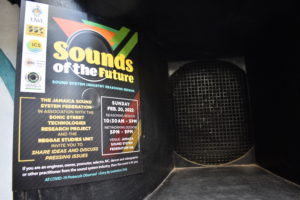
Sounds of the Future poster. Image © David Katz.
With minimal technical glitches, high academic standards and a broad range of material presented, the 7th Global Reggae Conference was a resounding success that points to Jamaica’s ongoing positioning at the forefront of investigations into reggae culture, supported by scholars farther afield. Plans are already afoot for the 8th edition (hopefully to take place in 2024), so connect with the Institute of Caribbean Studies to keep abreast of developments.
—
Born in San Francisco and long resident in London, David Katz is the author of People Funny Boy: The Genius of Lee ‘Scratch’ Perry and Solid Foundation: An Oral History of Reggae. He has produced documentaries for Public Radio International, including Ring the Alarm: A History of Sound System Culture and has hosted the monthly reggae vinyl night Dub Me Always since 2004. Visit him at www.davidkatzreggae.com
